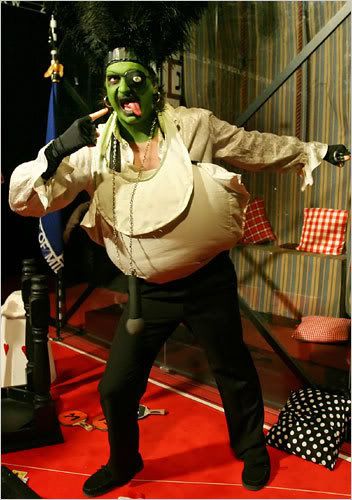by Lonely Christopher

A note from Richard Foreman: “Most theater and film offers narrative examples of how human beings navigate daily life --- either mundane or extreme situations. I admit this doesn’t interest me.” The divorce of theater from mimesis has such severity here that that statement is comically brusque. In Foreman’s work, the signification of all the elements of theater aren’t clumsy methods for reaching some meaning that the signification is supposed to jab at while simultaneously obstructing somewhat. The audience wants to get behind the mechanics of signification as if there is anything there. The man with a puffy stomach and green face sticks his tongue out and points to it. A figure enters with a grandfather clock on his back; presently he is curtained with a sheet held by two others. The audience is being shown nonrepresentational activities, which is actually uncomfortable but fascinating: we want these unfolding disclosures to transparently deliver us to a signified, a narrative, an objective correlative. Foreman makes everything available on the surface. This is not a theater of deceit or misdirection --- it is not rude/silly either (unlike, maybe, Offending the Audience). The audience is told beforehand that John Zorn’s music will begin five minutes into the performance --- it does. This anticipatory gesture imbues all the creaks and swishing incidental noises with serious import before the score kicks in to drown them out with Zorn’s self-aware, heavy metal racket. There isn’t much silence thereafter, or talking. I only remember one line of dialog, repeated maybe twice by the same woman, something like: “Hi! I believe everything that comes out of a human mouth.” The drama is an accumulation of mimed negotiations. What happens is not choreography: rarely do the actors seem to have any awareness of the score. Foreman explains: “John’s music, alternately calm and intense, presents a challenging occasion within which I have tried to situate my own aesthetic program.” A play like this goes maybe about as far into nondenotative territory achievable within the form. I am almost amazed it never comes off as tacky or facile. I read the reason for its success in Foreman’s mention of an “aesthetic program,” the rubric under which all aspects of his theater are organized --- this provides relationships between everything. Get with the program: Astronome runs through April 5 at the Ontological-Hysteric Theater of St Mark’s Church, details here.
No comments:
Post a Comment